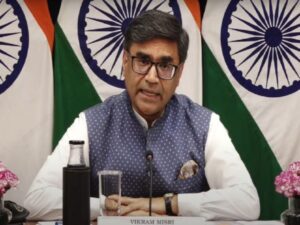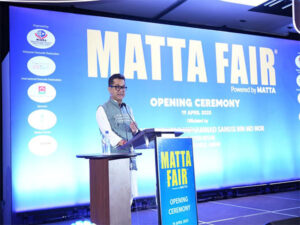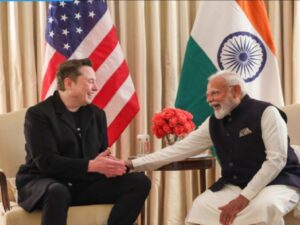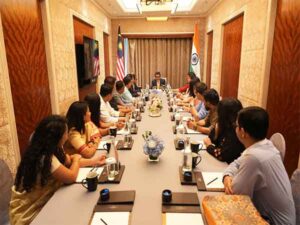Quad announces establishment of Working Group on Counter-Terrorism
New Delhi [India], March 3 (ANI): Quad grouping of countries comprising of US, Japan, Australia and India on Friday announced the establishment of a Working Group on Counter-Terrorism in sharpening of the group’s focus to combat terror.
A joint statement of the Quad Leaders issued in New Delhi today denounced the use of terrorist proxies and committed to promote accountability for terrorist attacks including the 26/11 attack in Mumbai, “which claimed lives of citizens from all Quad countries”. Heavily-armed terrorists from Pakistan struck in Mumbai on November 26, 2008 in which at least 174 people, including 26 foreign nationals, were killed and over 300 people injured.
“We announce the establishment of the Quad Working Group on Counter-Terrorism, which will explore cooperation amongst the Quad and with Indo-Pacific partners, to counter new and emerging forms of terrorism, radicalization to violence and violent extremism,” the joint statement said.
It noted that terrorism has become increasingly diffuse, aided by terrorists’ adaptation to, and the use of emerging and evolving technologies such as unmanned aerial systems (UAS) and the internet, including social media platforms for recruitment and incitement to commit terrorist acts, as well as for the financing, planning, and preparation of terrorist activities.
The group also welcomed the focused discussions on these themes at the Quad Counter-Terrorism Policy Meeting and tabletop exercise hosted by Australia in October 2022 and said it looked forward to its first meeting in the United States in March 2023 to continue discussions on this global issue.
Earlier during a panel discussion on “The Quad Squad: Power and Purpose of the Polygon,” External Affairs Minister S Jaishankar said that new things have come out during the Quad Foreign Ministers’ Meeting.
“If you ask me what were the new things which came out today, we agreed on a counter-terrorism working group. We agreed on cooperating more closely with Indian Ocean Rim Association. We agreed that we had earlier worked out a Humanitarian Assistance and Disaster Relief (HADR) Quad initiative,” said Jaishankar.
“We are pleased to note the progress made under the Quad Humanitarian Assistance and Disaster Relief Partnership (HADR) for the Indo-Pacific, since our last meeting in September 2022, when we signed the Guidelines for the Partnership,” read the statement
Quad welcomed the outcomes of the first HADR tabletop exercise and biannual meeting held in India in December 2022 and looks forward to the finalization of the Partnership’s Standard Operating Procedures (SOP) which would enable an efficacious and coordinated response mechanism.
Jaishankar also said that one of the outcomes that Quad agreed on was that the listings of terrorists, the counter-terrorism listings should not be politicised.
“We unequivocally condemn terrorism and violent extremism in all its forms and manifestations. We denounce the use of terrorist proxies and emphasize the importance of denying any logistical, financial or military support to terrorist organizations which could be used to launch or plan terrorist attacks, including transnational and cross-border attacks,” read the joint statement.
Moreover, Quad reiterates the condemnation of terrorist attacks, including 26/11 Mumbai, which claimed the lives of citizens from all Quad countries, and the Pathankot attacks.
“We are committed to working together with our regional and international partners to promote accountability for the perpetrators of such terrorist attacks, including through designations by the UN Security Council 1267 Sanctions Committee. In this regard, we express our concern at attempts to politicise the working of the UNSC Sanctions Regimes and call on all states to maintain the transparent, objective and evidence-based working methods of UNSC Sanctions Committees,” added the statement.
Speaking on reforms in the UN and Standard Operating Procedures on counter-terrorism, Jaishankar said, “So the SOP for that which I think the military people would obviously see as a prerequisite for their cooperation. We coordinated with the UN to make sure that the processes of the UN are respected and workings of the UN stayed true to its spirit. I was personally happy that there was a stronger expression of support from all of us collectively to the reform of the UN to the fact that there would be inter-governmental negotiations on the reform.”
He said that the Quad is working in 2023 because we have a leadership less burdened by baggage.
“I take the Quad back to Boxing Day 2004 when the Indian Ocean Tsunami happened. In 2006, when Prime Minister Abe came to India, before coming he had the idea that Quad could be an effective way of dealing with the challenges. There was actually a Quad meeting, my memory serves me right, in Manila in 2007. Then it did not work out. If you ask me why didn’t it work out, as opposed to what happened 10 years later because it was revived 10 years later in 2017,” said Jaishankar.
“In 2019, it became a Foreign Minister’s level, and when the Biden administration came in in 2021, it became a Summit level. One, there was greater strategic clarity on the part of all the countries concerned. If I were to look at India’s ties with the US, it became much deeper. With Japan also, grew, and the real big change has been in the last decade has been with Australia. In a way, Quad is working in 2023 because we have a leadership less burdened by baggage,” the external affairs minister added.
Meanwhile, in the joint statement issued today the Quad sought an end to violence and detentions by the Myanmar Junta. On Ukraine, the joint statement said they “continued to discuss our responses to the conflict in Ukraine and the immense human suffering it is causing, and concurred that the use or threat of use of nuclear weapons is inadmissible”.
“We underscored the need for a comprehensive, just and lasting peace in Ukraine in accordance with international law, including the UN Charter. We emphasised that the rules-based international order must respect sovereignty, territorial integrity, transparency and peaceful resolution of disputes,” the statetement added.






